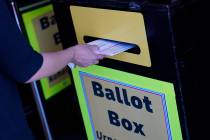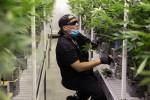The pitfalls of legal marijuana
Nevada voters are being asked to legalize the use of marijuana for adults. Excerpts from recent Review-Journal stories and opinion pieces on the proposal:
•A study published in a Scandanavian medical journal suggests there could be a link between heavy marijuana usage in teens and lowerIQ scores.
The researchers called the findings “tentative” because of a small sample size and said they would need to be “verified with a largerstudy with more participants.”
The study, published last week in the peer-reviewed journal Acta Psychiatrica Scandinavica, was done by a team of researchers inLondon, Ontario. It comes a month before voters in Nevada and four other states decide whether to legalize the recreational use ofmarijuana in the Nov. 8 election.
Researchers from Lawson Health Research Institute and Western University, both in London, Ontario, examined a group of 74 teenagers younger than 17, aiming to determine whether marijuana use helped with depression symptoms.
Teens were split into four groups: frequent marijuana users suffering from depression, frequent marijuana users without depression,those with depression who were not marijuana users and teens who said they were not depressed and did not use marijuana. Thegroups were put through psychiatric, cognitive and IQ testing and brain scanning. The study found that marijuana didn’t improvedepression symptoms.
The study also found that early marijuana use was associated with lower IQ.
Marijuana opponents in Nevada say the study shows why Question 2, which would legalize recreational marijuana for adults 21 andover, is bad for the state.
From an Oct. 12 Review-Journal story, “Study boosts pot foes.”
•Colorado, which began its recreational marijuana industry in early 2014, has experienced some alarming trends that should be given more time to play out before Nevada runs headlong into the fray.
While marijuana sales are regulated to adults 21 and over, there has been an increase in youth use between age 12 and 17 in Colorado that cannot be ignored. The state now ranks first in the nation in youth marijuana use, increasing 20 percent in two years since legalization. That is up from 14th in the nation in 2006. According to a national survey by the federal Substance Abuse and Mental Health Services Administration, nearly 12.56 percent of Colorado youth used marijuana within the past month, far and away the highest percentage in the country.
From a commentary by Andrew Knightly, editor of the Pahrump Times
•In a report last Sunday for “60 Minutes,” CBS correspondent Dr. Jonathan LaPook talked to a pediatrician in Colorado, which approved a recreational marijuana measure in 2014. Dr. Steven Simerville told Dr. LaPook, “It’s affecting the emergency room, it’s affecting the operating room, it’s affecting just about every aspect of medicine that you could think of.”
Dr. Simerville is the medical director of the newborn intensive care unit at Pueblo’s Saint Mary Corwin Medical Center. He said that in the first nine months of 2016, 27 babies born at his hospital tested positive for THC, the psychoactive ingredient in marijuana. That’s on track to be about 15 percent higher than last year. Included in the 2016 total were multiple infants in his unit at the time of his interview with Dr. LaPook.
Dr. Simerville noted that the mothers are not surprised by the positive THC test, but they’re in disbelief that marijuana is harmful. “They frequently say, ‘How can it be harmful? It’s a legal drug.’ ” Dr. Simerville noted that today’s marijuana is four to five times stronger than in the 1980s, and can also get passed on to infants in high concentrations in breast milk.
From a Nov. 4 Review-Journal editorial, “Affecting everything”
•The Boulder Convention and Visitors Bureau has taken a few calls from curious out-of-staters since Colorado’s first retail pot store opened in 2014 in the college town.
Those callers usually are directed to Google, but that hasn’t stopped the topic from being broached in industry circles, said Mary Ann Mahoney, executive director of Boulder’s tourism office.
“(They ask) has the marketplace changed? Have we gotten more and more visitors?” she said. “To tell you the truth, it’s just kind of on the radar, but not very much.”
Mahoney said she and her colleagues consider themselves students of Boulder, and will continue to track the cannabis industry and see how it might resonate with tourists like the booming craft beer industry has in recent years.
“If that’s what it is, then again, we have to follow (state and city regulations) and keep within what’s legal to promote,” she said. “We’re marketing to a national and international audience.”
Mahoney noted that some members of the business community have expressed concern about marketing the cannabis industry because they believe the legal marijuana industry has generated unintended consequences: a greater influx of “travelers” that have strained resources and created problems in the city and neighboring foothills.
Reprinted by the Review-Journal with permission from The Denver Post. Original story can be found at http://www.denverpost.com/2016/09/29/marijuana-tourism-legalized-states/























